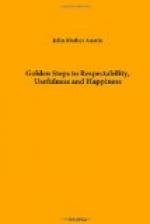“Ignorant, indeed! Ignorance consists in a want of knowledge of those things which your calling or state of life naturally supposes you to understand. A ploughman is not an ignorant man because he does not know how to read. If he knows how to plough, he is not to be called an ignorant man; but a wife may be justly called an ignorant woman, if she does not know how to provide a dinner for her husband. It is cold comfort for a hungry man, to tell him how delightfully his wife plays and sings. Lovers may live on very aerial diet, but husbands stand in need of something more solid; and young women may take my word for it, that a constantly clean table, well cooked victuals, a house in order, and a cheerful fire, will do more towards preserving a husband’s heart, than all the ‘accomplishments’ taught in all the ‘establishments’ in the world without them."[13]
[Footnote 13: Young Man’s Guide.]
Other considerations might be urged on the young of both sexes, as prerequisites to a hopeful and a happy marriage. But if the reflections already offered are duly heeded, they will enable those who are influenced by them, to secure the blessings and escape the evils of the marriage state. As a general remark, I would suggest that in selecting a companion for a connection so lasting, it should be a leading object to find as great a similarity of opinions, habits, tastes, and feelings, as possible. This is especially important in regard to religious sentiments. It is a serious misfortune for a young married couple to find themselves differing materially on the subject of religion. This is more particularly an evil when both are strongly attached to their respective opinions, and anxious to attend different churches. I have frequently known this greatly to embitter the cup of domestic enjoyment. Where husband and wife can sympathize in each other’s sentiments—can walk together to the house of God, with their children—can strengthen and enlighten one another in regard to the great truths to which they there listen—can unite in instructing their family in the same doctrines and principles of Christianity—it opens one of the highest and sweetest sources of domestic happiness. But an absence of this unity in religious opinions, is liable to lead to frequent disputations and contentions, which often result in recriminations, and hard and bitter feelings. There are not wanting instances where the most serious difficulties and the greatest unhappiness have grown out of these disagreements. Hence it is both proper and needful, to admonish the young, in choosing a wife or a husband, to make a concurrence in religious faith, one of the great essentials requisite to a union.




